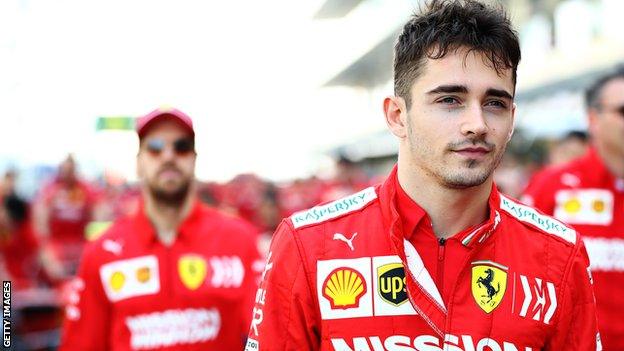Charles Leclerc: Ferrari driver signs new five-year contract until 2024
- Published

Charles Leclerc won two races in his first season with Ferrari
Charles Leclerc has signed a new five-year contract with Ferrari until 2024.
It follows an impressive first season for the Italian team after replacing Kimi Raikkonen for the 2019 season.
The 22-year-old from Monaco won back-to-back races in Belgium and Italy and scored seven pole positions, more than any other driver.
Leclerc finished fourth in the drivers' standings, ahead of his four-time world champion team-mate Sebastian Vettel, who he beat on every metric in 2019.
Leclerc scored more wins, poles and points than Vettel, and in qualifying beat him 12-nine on their head-to-head and was 0.111 seconds quicker on average.
Ferrari team principal Mattia Binotto said: "With each passing race this year, our wish to extend our contract with Charles became ever more self-evident and the decision means he will now be with us for the next five seasons.
"We are very pleased that he will be with us for many years to come and I'm sure that together we will write many new pages in the history of the Prancing Horse."
Leclerc said on Twitter: "I'm so grateful to be driving for such a team. I've learnt so much during this first year. It is a great starting point to build a strong relationship for the years ahead."
Leclerc joined the Ferrari Driver Academy in 2016 and made his Formula 1 debut with the affiliated Alfa Romeo-backed Sauber team in the 2018 season, finishing 13th in the standings with 39 points from 21 races.
Analysis - Leclerc is Ferrari's future
Leclerc's new Ferrari contract confirms what was already self-evident throughout his highly impressive 2019 season - he is the future of Ferrari in F1.
Ferrari put him in the car in place of Raikkonen for 2019 because they saw in him a young man with enormous potential to become one of the defining figures of F1 in the 2020s and he has fully lived up to expectations.
He started the season as a de facto number two to Vettel, to whom the team said they would give priority in any close calls.
But Leclerc's natural speed caused problems from the start, and forced them into a series of uncomfortable situations where they had to use team orders to settle their drivers' positions.
He should have won his second race for Ferrari, turning in a performance in Bahrain that was as dominant as any by any driver all year, only for his engine to lose a cylinder in the closing laps, allowing Lewis Hamilton to catch him up and pass him for victory.
Leclerc made a few too many mistakes in the first half of the season, many a function of his inexperience, but from mid-summer he went on a remarkable run of races in which he out-qualified Vettel nine times in a row.
Starting in Belgium, he scored four pole positions in succession, and the weekend in Spa saw his first victory, which he followed up at Ferrari's home race in Monza a week later, to the delight of the thousands of cheering tifosi below the podium, hailing him as the new hero of the Italian fans. Both were highly accomplished drives in which he had to fend off significant pressure from Hamilton.
Leclerc should have taken a third consecutive victory in Singapore, only for Ferrari's strategists to inadvertently leapfrog Vettel ahead of him when they had simply been trying to get the German ahead of Hamilton into second place.
And he lost a fourth win in Russia when a badly timed virtual safety car, ironically caused by Vettel's retirement, handed the race to Hamilton.
That run of success led to increasing tensions with Vettel, and there was a series of flash points between the pair.
Each was guilty to one degree or another of ignoring team orders, but the nadir was Brazil when the Ferrari drivers crashed together as a result of Vettel moving over on Leclerc when trying to re-take the third place the younger man had snatched from him a couple of corners before with an audacious overtaking move.
The rivalry between the drivers will be a headache for Binotto heading into 2020, and already looks set to be one of the defining narratives in F1 for the second season in succession.
But the dynamics have shifted. Now, it is Leclerc who is effectively the team's lead driver, as the man who decisively out-performed his more illustrious team-mate in 2019 and with the powerful statement of a new five-year deal in his pocket.
Vettel, by contrast, is out of contract at the end of the year and his future is in doubt.
Next year will start with question marks about the futures of most of the top drivers - Hamilton, Vettel, Red Bull's Max Verstappen, Mercedes' Valtteri Bottas and Renault's Daniel Ricciardo all have contracts up for renewal.
If any of them fancy their chances at Ferrari, they now know whom they will be up against - and how much the team have invested in him.